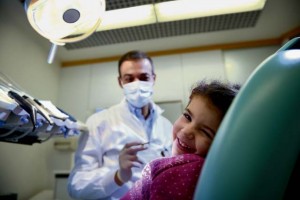Picture this: A mother takes her 4-year-old to the dentist for her child’s annual checkup. During the appointment the dentist diagnoses the child with a cavity that needs treatment and a few areas that could lead to future cavities, but do not require treatment at this time. That same day, the mother is able to schedule a return appointment. When she speaks with her husband, he is disappointed because he had a surprise trip planned for the family at the same time the child is scheduled for dental treatment. The husband divulges the surprise and since the child is not in pain, the mother makes the decision to cancel the scheduled treatment.

Several months go by, and life catches up with this family. The mother seeks urgent dental care when the child starts running a fever from a problem tooth. She anxiously brings her child to sick call, and the same dentist from a year ago reviews the child’s documented treatment needs. What should have been a simple treatment now requires extensive dental care.
Tooth decay is the single most common chronic childhood disease. It is five times more common than asthma and seven times more common than hay fever. Children who lack basic dental care miss more days of school and see a general decline in health.
According to the Centers for Disease Control and Prevention, untreated tooth decay is progressive and can be devastating to children’s long-term health, such as with eating, speaking, playing and learning.
In extenuating circumstances, untreated tooth decay can even lead to death. In 2007, a 12-year-old boy named Deamonte Driver had an abscess that resulted from tooth decay. His mother, who had a small income, searched desperately to find a dentist that would take her insurance. Deamonte’s pain was so intense that his mother ended up taking him to the emergency room. He was given antibiotics to treat sinusitis and a dental abscess then sent home. Unfortunately, Deamonte’s situation worsened, and he was rushed back to the hospital and into surgery. The young boy had a bacterial infection from the dental abscess that spread to his brain. Deamonte suffered through two surgeries and eight weeks of rehabilitative care and therapy totaling $250,000. None of these efforts spared the young boy’s life. On Feb. 25, 2007, Deamonte died at the age of 12.
Unlike Deamonte’s mother, active-duty personnel have great dental care available for their dependents and themselves.
The 86th Dental Squadron has dentists that specialize in pediatric needs. A child’s first visit to the dentist should happen between the eruption of the first tooth and their first birthday. Bringing the child to the dentist at a young age is the best way to identify and treat problems. It is also a great way for parents to learn dietary and fluoride counseling as well as proper oral hygiene techniques.
Remember, cavities can start as soon as teeth are present in the mouth, so don’t wait until it’s too late.


